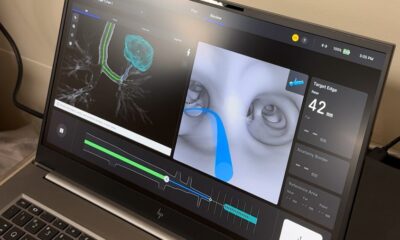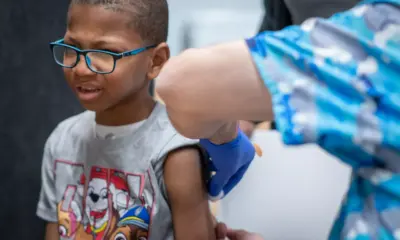Health
Parents Weigh Safety and Independence in Tracking Young Adults
As parents navigate the complexities of raising young adults, many are grappling with the decision of whether to track their children’s movements using GPS technology. A recent experience shared by a parent reveals the emotional tension behind this modern parenting tool, as they could see their twin sons driving to Florida while contemplating the appropriateness of monitoring their whereabouts now that they are college students.
According to a **2024 Pew Research Center** report, approximately **one in four parents** admit to tracking their young adult children’s locations through various apps. Despite this statistic, anecdotal evidence from parental peer groups suggests that many parents are choosing to track their children for peace of mind rather than out of a desire to invade their privacy.
Parents like **Christy Keys**, whose daughter Ella studies at the **University of Tennessee**, express that tracking offers reassurance: “We have never had to question her whereabouts, and unless her location looked really suspicious, we won’t.” Similarly, **Kim Asher**, a parent of a senior at **George Washington University**, noted that her son prefers her to know his location, especially given the unpredictable nature of urban life in Washington, D.C.
Technology’s Dual Role in Parenting
The insights shared by parents highlight a crucial aspect of contemporary parenting. Technology serves not only as a tool for reassurance but also as a means to respect their children’s autonomy. Many parents report using tracking apps to check that their children are safe before making calls, ensuring they are not driving or in class. This cautious approach allows parents to maintain contact while giving their children space to grow.
**Sarah Gallagher Trombley**, a former executive at **Snapchat** and founder of **Digital Mom Media**, acknowledges the unique challenges parents face today. “It’s not all bad,” she stated, emphasizing the comfort that many young adults find in knowing their parents are looking out for them. The relationship dynamics have shifted, particularly following the **COVID-19 pandemic**, which brought families closer together, complicating the transition to independence for many young adults.
While tracking technology provides parents with a sense of security, it can also lead to unnecessary anxiety. One parent recounted a situation where a GPS app indicated that their child was in a potentially dangerous area at 1 a.m., prompting a frantic search that turned out to be unnecessary. Such experiences raise questions about the implications of constant monitoring and the potential strain it could place on the parent-child relationship.
Balancing Safety with Independence
Experts caution against over-reliance on tracking apps, arguing that they can undermine trust and hinder young adults from taking responsibility for their actions. **Tracy Foster**, co-founder of **Screen Sanity**, suggests that while tracking can be acceptable, it must be approached with respect for boundaries. She shared a story of a **29-year-old** who recently stopped being tracked, leading to frustration from their parent who had not recognized the shift in their child’s independence.
Foster advocates for a parenting approach that transitions gradually from guidance to independence, likening it to learning to drive. “As a parent, you start in the driver’s seat, and then you move to the passenger seat, and eventually your child is driving by themselves,” she explained. This metaphor illustrates the importance of letting young adults take control of their lives while still offering support.
Interestingly, some young adults have expressed their willingness to remain in family tracking groups, not out of obligation, but as a way to alleviate their parents’ concerns. This reciprocal arrangement highlights a shift towards mutual care, where young adults also take on the responsibility of looking out for their parents.
As families adapt to the evolving dynamics of parental monitoring, many are finding a middle ground. **Jennifer Rowland**, a parent from **Nashua, New Hampshire**, shared her experience of tracking both her daughter at university and her father, who was recovering from health issues. This dual role of caregiver reflects the complexities of modern family life, where concerns span multiple generations.
In conclusion, while tracking apps can offer parents a sense of security regarding their children’s safety, it is vital to strike a balance that respects their growing independence. As children transition into adulthood, maintaining strong family ties while allowing them the freedom to thrive becomes essential. Ultimately, the journey of parenting is about fostering trust, respect, and understanding, even in an age dominated by technology.
-

 Technology5 months ago
Technology5 months agoDiscover the Top 10 Calorie Counting Apps of 2025
-

 Health2 months ago
Health2 months agoBella Hadid Shares Health Update After Treatment for Lyme Disease
-

 Health3 months ago
Health3 months agoErin Bates Shares Recovery Update Following Sepsis Complications
-

 Technology4 months ago
Technology4 months agoDiscover How to Reverse Image Search Using ChatGPT Effortlessly
-

 Technology1 month ago
Technology1 month agoDiscover 2025’s Top GPUs for Exceptional 4K Gaming Performance
-

 Technology2 months ago
Technology2 months agoElectric Moto Influencer Surronster Arrested in Tijuana
-

 Technology5 months ago
Technology5 months agoMeta Initiates $60B AI Data Center Expansion, Starting in Ohio
-

 Technology5 months ago
Technology5 months agoRecovering a Suspended TikTok Account: A Step-by-Step Guide
-

 Health4 months ago
Health4 months agoTested: Rab Firewall Mountain Jacket Survives Harsh Conditions
-

 Lifestyle5 months ago
Lifestyle5 months agoBelton Family Reunites After Daughter Survives Hill Country Floods
-

 Technology4 months ago
Technology4 months agoHarmonic Launches AI Chatbot App to Transform Mathematical Reasoning
-

 Technology3 months ago
Technology3 months agoUncovering the Top Five Most Challenging Motorcycles to Ride





















